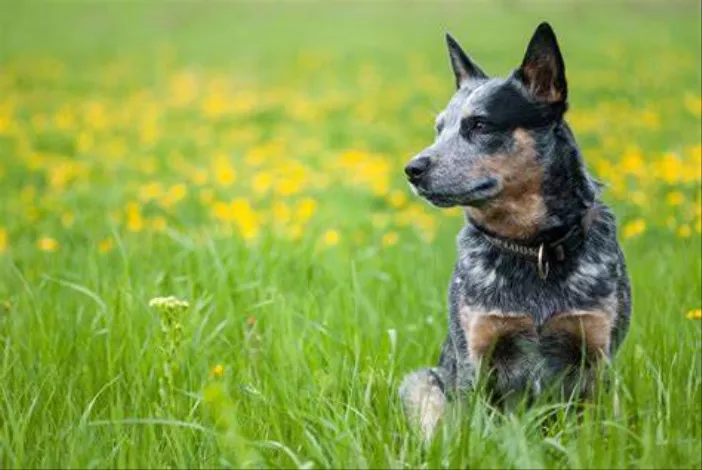Australian Cattle Dogs, known for their intelligence, herding instinct, and striking appearance, are beloved for their loyalty and working ability. However, they also have a reputation for being intense and, at times, displaying aggressive behaviors. In this comprehensive article, we will explore the question, “Are Australian Cattle Dogs aggressive?” and delve into effective training methods to ensure these remarkable dogs are well-balanced, well-behaved companions.
Understanding Australian Cattle Dogs
Before we discuss aggression and training, it’s essential to understand the breed itself. Australian Cattle Dogs, often referred to as Blue Heelers or Queensland Heelers, are medium-sized dogs known for their herding abilities and striking blue, blue speckle, or red speckle coat. These dogs are highly intelligent, energetic, and strong-willed, making them excellent working dogs and loyal companions.
Australian Cattle Dogs are known for their protective nature, which can sometimes be perceived as aggression. To address this perception and ensure your dog is a well-adjusted pet, proper training is essential.
The Aggression Perception
The perception of Australian Cattle Dogs as aggressive is rooted in their strong herding instincts and protective nature. These dogs were originally bred for herding cattle, and they possess a natural drive to control and move livestock. While this herding instinct can be a valuable trait, it can sometimes be misinterpreted as aggression when directed towards people, especially if the dog is not properly trained.
Understanding the Difference Between Aggression and Behavior
It’s crucial to distinguish between aggressive behavior and normal herding and protective instincts. Aggressive behavior is typically driven by fear, dominance, or territoriality and involves actions such as growling, snapping, or biting. On the other hand, herding and protective instincts are innate behaviors in Australian Cattle Dogs, and when properly trained, these behaviors can be controlled and directed in a positive way without aggression.
Effective Training Methods
To ensure your Australian Cattle Dog is a well-balanced and well-behaved pet, it’s essential to implement effective training methods. Here are some key training techniques and principles to consider:
Socialization: Early socialization is critical for Australian Cattle Dogs. Expose them to a variety of people, animals, and environments from a young age. Positive interactions with others help reduce fear and aggression towards strangers.
Obedience Training: Consistent obedience training is vital. Teach basic commands such as “sit,” “stay,” “come,” and “leave it.” Obedience training provides structure and control, allowing you to redirect herding instincts in a positive way.
Positive Reinforcement: Australian Cattle Dogs respond exceptionally well to positive reinforcement. Use rewards like treats, praise, and toys to encourage good behavior. Reinforce desirable actions and behaviors while ignoring or redirecting undesirable ones.
Exercise and Mental Stimulation: These dogs have high energy levels and require both physical exercise and mental stimulation. Engage in activities like agility, obedience trials, or herding trials to satisfy their need for both physical and mental challenges.
Channel Herding Instincts: Leverage your dog’s natural herding instincts for positive activities. Introduce them to activities like dog sports, frisbee, or even herding training. Providing an outlet for their herding drive can reduce the risk of it being expressed negatively.
Control Overprotectiveness: While Australian Cattle Dogs are naturally protective, it’s crucial to establish that you are the pack leader. This control will help them understand when protection is necessary and when it’s not.
Desensitization: Gradual desensitization to triggers that may provoke aggressive behavior is essential. Expose your dog to potential triggers in a controlled and positive manner, rewarding them for calm responses.
Consistency: Consistency in training methods and expectations is key. Set clear boundaries and enforce them consistently. Inconsistency can lead to confusion in your dog and, potentially, undesirable behaviors.
Behavioral Issues and Aggression Prevention
In some cases, Australian Cattle Dogs may exhibit behavioral issues that can lead to aggression. Here are some common issues and tips for prevention:
Resource Guarding: Dogs may become possessive of food, toys, or other resources. Prevent resource guarding through early training, teaching your dog to willingly share or give up items when asked.
Fear Aggression: Fear can lead to aggression in any breed. Ensure your dog is exposed to various environments and experiences to reduce the likelihood of fear-induced aggression.
Territorial Aggression: Some dogs may become territorial and aggressive when they feel their space is threatened. Training can help your dog understand that not all visitors are threats.
Dog Aggression: Aggression towards other dogs can be a concern, especially if your Australian Cattle Dog was not well-socialized with other canines. Controlled introductions and positive socialization can help reduce dog aggression.
Human Aggression: While rare, some Australian Cattle Dogs may display human aggression. If you observe any aggressive behavior towards people, seek professional help from a dog behaviorist or trainer to address and manage this issue.
Conclusion
Australian Cattle Dogs are not inherently aggressive, but their strong herding instincts and protective nature can sometimes be misinterpreted as aggression. With proper training, socialization, and positive reinforcement, these dogs can be well-balanced, well-behaved, and loving companions.


